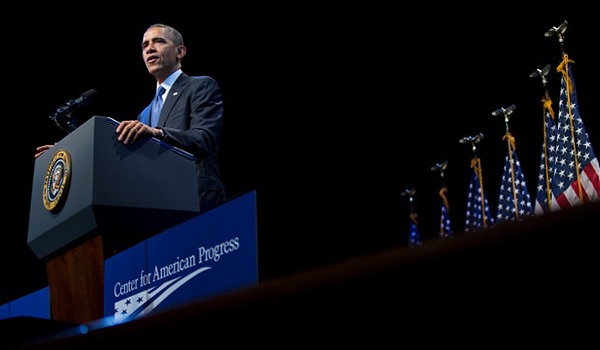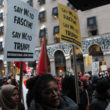Next month, we celebrate two anniversaries—the beginning of the War on Poverty (1964) and the North American Free Trade Agreement (NAFTA, 1994). So it is a good time to consider how these two programs affected the working class and how they continue to shape working-class political attitudes toward the Democratic Party.
The War on Poverty was President Lyndon Johnson’s attempt to address economic inequality and poverty in America, in part in response to the Civil Rights movement, including the March on Washington, which identified both jobs and freedom as its goals. The War on Poverty included legislation to establish food stamps, the expansion of Social Security to include Medicare and Medicaid, the creation of the Office of Economic Opportunity (Job Corps, VISTA, Head Start, Legal Services), and various educational initiatives all geared to reducing economic inequality.
| NAFTA and welfare reform give poor and working-class voters, and the community and labor groups that advocate for their interests, good reason to feel betrayed by the Democratic Party. |
But just how much progress has been made? Public assistance did help reduce the poverty rate, and since the early 1970s it has vacillated between 12 percent and 15 percent. But a recent Pew study found that income inequality is currently the highest since 1928, leading conservatives to channel President Ronald Reagan’s claim that “We fought the war on poverty and poverty won.”
Over the following six decades, the War on Poverty was increasingly fought within a broader context of globalization and neoliberal policies, and free trade has been a highly contested element. For example, 20 years ago, using a blizzard of research and marketing, NAFTA proponents claimed that the new trade deal with Canada and Mexico would be a boon for U.S. exports and create high-paying American jobs. Opponents argued that NAFTA would cost jobs (that “giant sucking sound”), erode labor and environmental standards, and undermine national sovereignty. The debate was fairly even until President Bill Clinton became a champion of NAFTA to the dismay of labor and working-class supporters, who saw his support as evidence that the Democratic Party had embraced neoliberalism.
Opponents were correct on all counts. NAFTA’s expansion of investor privileges promoted offshoring. Instead of bringing the new jobs promised by corporate and government apologists, NAFTA has resulted in massive job losses—more than 1 million jobs—especially in manufacturing, and export growth has slowed. NAFTA has also led to lower wages for the jobs that remained in the U.S. Even with cheaper prices for good and services, workers struggle to get by. Manufacturing communities have been especially hard hit, since the loss of industry and jobs eroded the tax base for schools, hospitals, and infrastructure. NAFTA contributed to increased inequality, and low-paid workers have suffered further from policies that benefit multinational corporations by undermining consumer health and safety, environmental laws, financial regulations, and public-interest requirements.
Just as the poor and working class began to feel the impact of NAFTA, Clinton’s welfare reform initiative began to dismantle a core element of the New Deal welfare state that the War on Poverty was built on. The Personal Responsibility and Work Opportunity Reconciliation Act of 1996 (PRWORA) aimed to increase labor market participation while reducing “welfare dependency,” particularly Aid to Families with Dependent Children. While proponents insisted that welfare reform would promote the work ethic, they also blamed the unemployed and the working poor for their own difficulties. As many middle-class Americans have learned through recent experiences with job loss, unemployment and poverty are often the result of a weak job market and low wages and benefits—conditions created, or at least exacerbated by, NAFTA and other trade agreements. Public assistance would not be necessary if people were paid a living wage and there were Fair Trade Laws.
Ideologically, like NAFTA, welfare reform conformed to neoliberal principles, and in supporting both policies the Democratic Party broke faith with its historic New Deal principles. Together, NAFTA and welfare reform give poor and working-class voters, and the community and labor groups that advocate for their interests, good reason to feel betrayed by the Democratic Party.
In Ohio, in 1992, for example, labor and community groups engaged in massive organizing efforts to get Clinton elected. Yet within four years, Clinton’s trade and welfare policies had undermined both good paying jobs and social and economic support structures. Because of this betrayal, it would take more than a decade for Democrats to regain enough support to win statewide offices in Ohio. Meanwhile, at the national level, the Democratic Party seemed somewhat surprised that many trade unionists and community members would not support their presidential candidate in 2000, even though he promised Democratic support of their economic interests. Instead, many chose to vote their “social values”—”guns, gays, and God”—or just stayed home, seeing little difference between the Democratic and Republican candidates. While support for Democrats reemerged nominally in 2006 and 2008 in Ohio and nationally, that support remains fragile and often relies on voters suspending their disbelief in Democratic Party politics.
So where are we today? I would like to believe that we are entering into a new era where past welfare and trade policies will be contested. There is some evidence to suggest a growing critique of the role of neoliberal policies and trade agreements on poverty. For example, Pope Francis’s latest treatise has drawn attention to the emptiness of neoliberal economics, globalization, and its contribution to global poverty.
As in the 1960s, civil rights groups, community groups, and labor unions are organizing grassroots initiatives and state and local movements to increase the minimum wage and, in some cases, establish a living wage. Obama has testified that he takes income inequality “personally” and intends to make it a focus of his remaining years in office. Some senators are even bucking the Democratic Party’s Wall Street establishment. For example, Elizabeth Warren denounced the Wall Street-backed think tank, The Third Way, for its attempt to undermine Social Security.
But there does not seem to be much movement on trade deals, especially by the Democrats.
The new Trans-Pacific Partnership (TPP) currently under consideration has been called a supersized and nuclearized NAFTA. The Senate is having trouble even getting basic tracking information about the TPP, which will dramatically impact both trade and public policy. It seems unlikely that outspoken critics, like Warren, will be able to move fellow Democrats on emerging trade policy. Neoliberal trade policy remains the third rail for Wall Street and their legislative supplicants.
But if they are to regain the solid support of poor and working-class voters, Democrats must take a stronger populist approach and drop their commitment to neoliberal economics. That is, they must return to the social and moral principles of the War on Poverty.
John Russo is a Visiting Research Fellow at the Metropolitan Institute of Virginia Tech University and the associate editor of Working-Class Perspectives, where this originally appeared.







0 Comments